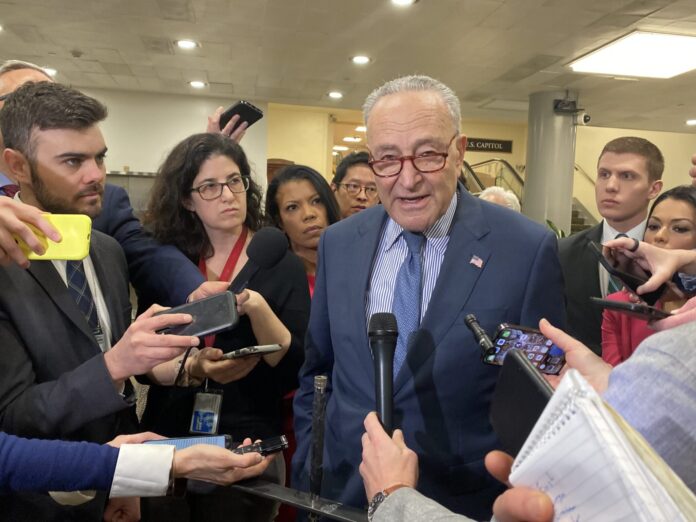
WASHINGTON (States Newsroom) — The U.S. Senate was stuck over whether to begin debate on an emergency spending bill Wednesday night that would provide $95.3 billion in assistance to Ukraine, Israel, and Taiwan — after senators blocked a sweeping larger package that would have overhauled immigration law for the first time in decades.
Republicans said last year that in order to get their support for military and humanitarian assistance to Ukraine, Israel, and Taiwan, they also needed Democrats to broker a deal on changes to immigration law.
GOP leaders, however, rejected that deal after it was released Sunday, leading Democrats to instead back separate assistance for the trio.
The global-aid-only alternative remained on hold Wednesday evening as Republicans and Democrats attempted to broker agreement over amendments.
Texas Republican Sen. John Cornyn said GOP senators still want to address border security and immigration law despite rejecting the package that included those provisions.
“Well, our side is not willing to give up the border fight. So some relating to the border,” Cornyn said.
Republicans are also hoping to get votes on amendments clarifying exactly who gets access to U.S. foreign assistance.
“I think possibly some related to the way the Ukraine money and the Israel money is distributed, some concerns about who might get their hands on it,” Cornyn said.
Senate Minority Whip John Thune, a South Dakota Republican, said before leaving the Capitol on Wednesday evening there are a lot of undecided issues.
“Well, those are all really good questions, and none of which have good answers at the moment,” Thune said.
Immigration deal cast aside
Senate Minority Leader Mitch McConnell had announced Tuesday that the immigration elements of the larger bill were unlikely to get enough support to become law after strong objections from Republicans and pressed for assistance for Ukraine, Israel, and Taiwan to move forward on its own.
Senators still took a procedural vote on whether to advance the bill that included the long-anticipated immigration overhaul, but it failed, 49-50. Sixty votes were needed for it to continue to move ahead, so it fell far short.
Oklahoma Republican Sen. James Lankford, Connecticut Democratic Sen. Chris Murphy, and Arizona independent Sen. Kyrsten Sinema spent the last four months negotiating the changes to immigration law that were scrapped within two days of the bill’s release.
Senate passage of the slimmed-down bill could come after an amendment process that Senate Majority Leader Chuck Schumer said Wednesday morning would be “open and fair.”
The New York Democrat also urged Republican leaders in the House to put the bill up for debate in that chamber should it pass the Senate.
“It doesn’t behoove the speaker well to block everything because 30 hard-right-wing people just want chaos like Donald Trump,” Schumer said.
It was not clear whether that would happen. The GOP-controlled House on Tuesday night failed to pass a standalone bill with $17 billion in aid for Israel.
House GOP leaders had also expressed strong opposition to the combined Senate immigration-global aid deal and said they would not bring it up for debate, adding more fuel to the opposition that torpedoed the package.
The former president, the front-runner for the GOP presidential nomination, has pressed hard for Republicans to reject immigration legislation.
Johnson: ‘A mess what happened here’
Speaker Mike Johnson, a Louisiana Republican, said Wednesday he would wait to see what the Senate can pass before deciding what he might bring to the floor next in that chamber.
“We’re allowing the process to play out and we’ll handle it as it is sent over,” Johnson said. “I have made very clear that you have to address these issues on their own merits.”
Johnson appeared to press for standalone aid to Israel, even though the House was unable to pass its Israel bill this week.
“Israel desperately needs the assistance, everyone knows that,” Johnson said. “Things have changed pretty dramatically since we passed that first Israel package in the House three months ago. Everyone knows the tensions escalated and we need to support it.”
Johnson also sought to rebuff criticism from some fellow Republicans that his inexperience is one of the reasons the House spectacularly failed to pass the Israel bill as well as two articles of impeachment against Homeland Security Secretary Alejandro Mayorkas on Tuesday night.
“It was a mess what happened here, but we’re cleaning it up,” Johnson said. “I don’t think that this is a reflection on the leader; it’s a reflection on the body itself and the place where we’ve come in this country.”
While the process is “messy sometimes,” Johnson said, “the job will be done.”
Fentanyl bill backed by Jelly Roll included
The Biden administration said Wednesday it supports Congress moving forward with legislation providing assistance to Ukraine, Israel and Taiwan while leaving off changes to immigration law.
“We support this bill which would protect America’s national security interests by stopping Putin’s onslaught in Ukraine before he turns to other countries, helping Israel defend itself against Hamas terrorists and delivering life-saving humanitarian aid to innocent Palestinian civilians,” said White House deputy press secretary Andrew Bates.
“Even if some congressional Republicans’ commitment to border security hinges on politics, President Biden’s does not,” Bates added. “We must still have reforms and more resources to secure the border. These priorities all have strong bipartisan support across the country.”
The revised bill the Senate could begin debating soon would provide more than $60 billion in assistance for Ukraine, $14 billion for Israel, and $9 billion for humanitarian aid in Ukraine, Gaza, the West Bank, East Africa, South Asia, and elsewhere, and $4.8 billion for “regional partners” in the Indo-Pacific region that would include Taiwan.
An additional $2.4 billion would go to U.S. Central Command “to replace combat expenditures for weapons in the Red Sea,” according to a summary of the bill.
The package also includes the Fentanyl Eradication and Narcotics Deterrence or Fend Off Fentanyl Act, a bipartisan bill from Ohio Democratic Sen. Sherrod Brown and South Carolina Republican Sen. Tim Scott.
Country music star Jason “Jelly Roll” DeFord advocated for Congress to pass legislation to address both the supply and the demand for fentanyl during a hearing in January.
Lankford: ‘We have to sit down together’
During debate on Wednesday, senators involved in negotiations or writing the broader bill that included changes to immigration law urged their colleagues to support the bipartisan compromise.
Lankford called on his colleagues to do something to address the nation’s border security and immigration laws, noting that neither party has the support to go at it alone on legislation.
“This very divided nation brings to us a very divided Congress,” Lankford said. “Currently, we have a Republican two-vote majority in the House of Representatives and a Democratic one-vote majority in the United States Senate. It doesn’t get much closer than that.”
“That means if we’re going to solve something, we have to sit down together and solve it. That’s how it works when you make law,” Lankford added. “You can do press conferences without the other side, but you can’t make law without the other side in the United States Senate.”
The Oklahoma Republican detailed the border security and immigration measures he and his two fellow negotiators agreed on following complex talks over several months.
He said that some Republicans voted against advancing the bill with border and immigration changes because they wanted more time to read it, that others voted no because they had policy differences, and that some voted no due to political disagreements.
“Some of them have been very clear with me; they have political differences with the bill,” Lankford said. “They say it’s the wrong time to solve the problem or let the presidential election solve this problem.”
There was a “popular commentator” who told Lankford four weeks ago that if he reached a bipartisan agreement to address border security and immigration law during an election year the commentator would do whatever they could “to destroy” Lankford.
“By the way, they have been faithful to their promise and have done everything they can to destroy me in the past several weeks,” Lankford said without disclosing the name of the commentator.
Sinema: Border security became ‘a talking point for the election’
Sinema said she, Lankford, and Murphy worked through weekends and holidays for months, “negotiating in good faith” to reach a compromise on border security and immigration.
“We produced a bill that finally, after decades of all talk and no action, secures the border and solves the border crisis,” Sinema said. “Our bill was ready for prime time, we were ready to bring the bill to the floor, open it up for debate and amendments. You know, how the Senate is supposed to work.”
“But less than 24 hours after we released the bill, my Republican colleagues changed their minds — turns out they want all talk and no action,” Sinema added. “It turns out border security is not actually a risk to our national security. It’s just a talking point for the election.”
Sinema said she had a “very clear message for anyone using the southern border for staged political events.”
“Don’t come to Arizona; take your political theater to Texas,” she said.
Murray: GOP telling allies ‘our word can’t be trusted’
Senate Appropriations Chair Patty Murray, a Washington state Democrat, urged Republicans to take the issues in the bills seriously and not as a “game,” pointing to the wars in Ukraine and Israel, as well as the Southwest border.
“By voting it down, Republicans will be telling our allies our word cannot be trusted. Telling dictators, like Putin, that our threats are not serious, telling the world American leadership has been hollowed out by Republican obstructionism,” Murray said.
“And let’s be clear, they will be telling the American people they don’t want to solve the crisis at the border, they want to campaign on it,” Murray added. “Because if you genuinely believe something is a crisis you take any step you can to address it, you don’t let a fire burn because Donald Trump wants to campaign on ashes.”
Ariana Figueroa contributed to this report.






